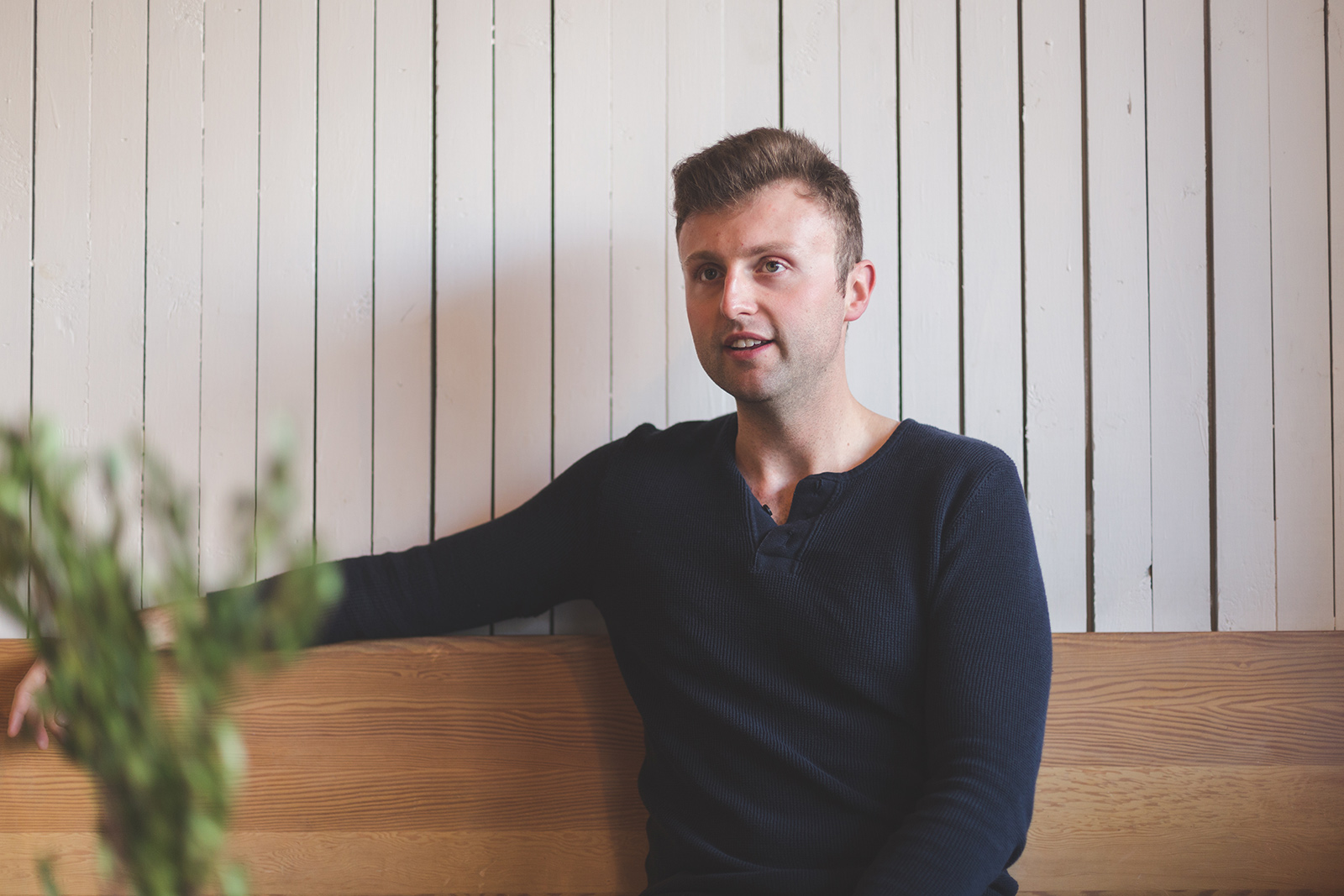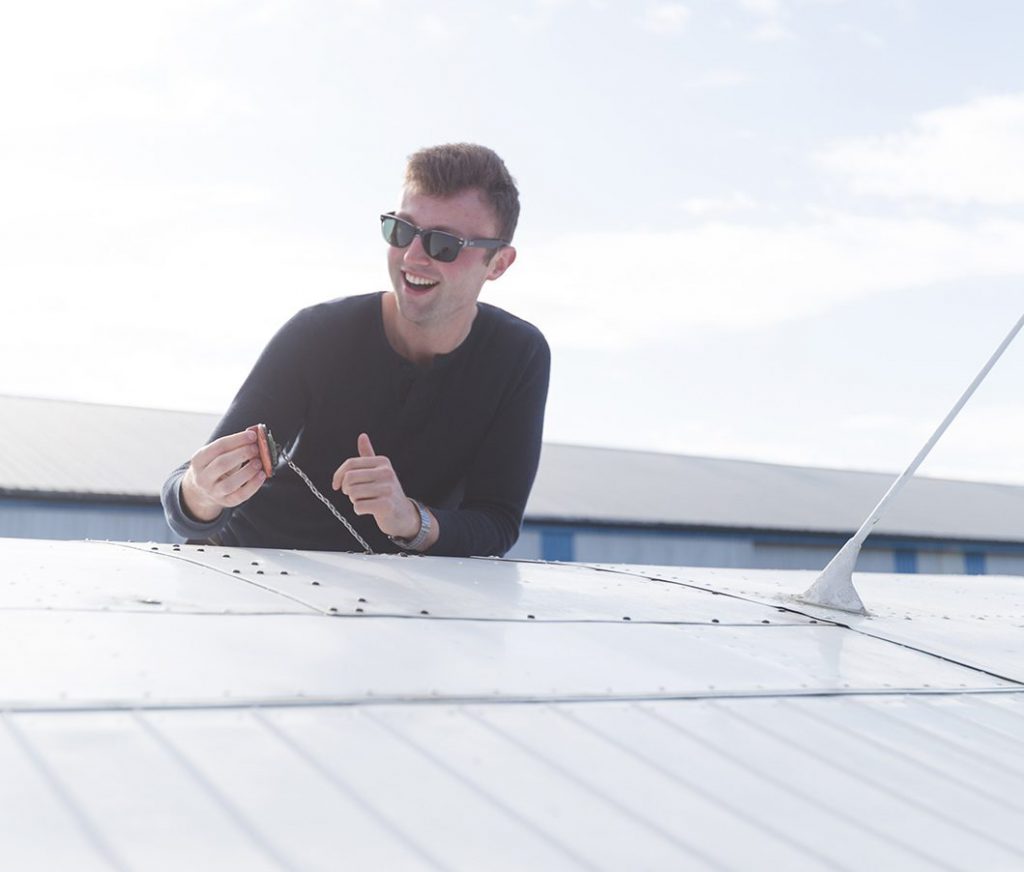Kyle’s Story
WHEN KYLE WAS GROWING UP, ALL HE REALLY WANTED WAS TO FIT IN. As early as Grade 3, for example, he remembers looking at the kids who sat at the back of the class – always chatting and laughing and having fun – and desperately wanting to walk up to them and crack a joke.
“I just wanted to have fun and be a normal kid,” says Kyle, who’s 27 now and studying to be a nurse. “But I was so afraid of what others thought of me, that I didn’t even try.”
Instead of walking up and starting a conversation, Kyle would stay glued to his seat. He’d convince himself that it was better that he didn’t approach those people anyway — that they were perfect and he was flawed — and that he wasn’t worthy of their friendship.
“I remember being so down on myself. I’d come back from school after seeing people in my class talking to each other and having fun, and I’d sit in my room and ask myself: why aren’t I normal like them? Why am I the only one having these emotions?”

THE BIGGEST EMOTION KYLE WAS FEELING was self-hate. Even in elementary school, he knew he was different from his peers, and he was starting to dislike himself for it.
“I really didn’t feel comfortable with myself. At the time I was very chubby and felt different because my family was economically marginalized,” Kyle recalls. “Also, I was starting to have feelings towards guys instead of girls, which was really confusing too.”
This self-loathing snowballed as Kyle reached middle school. There, he became completely anti-social, and would spend his recesses hiding away in a corner of the patio. If a teacher would ask a question in class, he wouldn’t raise his hand, even if he knew the answer.
“I would get this sensation of fear – it felt like a hole in my stomach – and I thought everyone was going to make fun of me if I talked.”
His classmates didn’t help much either. They did everything in their power to marginalize him even more and make him feel like an outsider: they bullied him, beat him up, and excluded him from social events.
By the time Kyle was in his early teens this isolation and self-loathing had grown into something else. Although he didn’t know it at the time, Kyle had begun to show some clear signs of depression and anxiety: he was always sad and extremely irritable, and had begun to push even his closest family members out of his life.
Soon enough, he felt completely hopeless and crippled by fear.
“There’d be days I’d wake up with this really intense pain inside of me, and it was almost like a fear of being out in society,” he says. “The pain would make me stay home for weeks. I wouldn’t go to school, nor interact with anyone, and in my head I felt like I was the only person in the world feeling this way…and I felt like it would never end.”
“I remember being so down on myself. I’d come back from school after seeing people in my class talking to each other and having fun, and I’d sit in my room and ask myself: why aren’t I normal like them? Why am I the only one having these emotions?”
WHEN HURRICANE KATRINA battered Louisiana in August of 2005, Kyle was over 2,000 miles away. He was 15 years old at the time, and lived in Halifax, Nova Scotia.
It seems difficult to imagine how such a distant event could have such a direct effect on Kyle’s life—but Destiny works in strange ways, and Katrina would inadvertently become a major turning point for Kyle.
“I was going to a Christian school at the time, and the administration organized a humanitarian trip down to New Orleans to help rebuild some of the houses that had been destroyed. When I heard about the trip, I immediately knew that I needed to sign up,” Kyle recalls.
Two things compelled Kyle to go on the trip: his passion for helping others, and his desire to see the world. Even though he had never travelled before, this was something he had always dreamed about. In fact, whenever he suffered from a bout of depression or anxiety, he’d fantasize about exploring foreign lands and meeting different people. And in Louisiana, he’d have the chance to do both.
“On a whim I told the person in charge that I wanted to sign up and help fundraise, and he agreed, so I ended up going. It was a three week trip, and I don’t know what exactly happened to me down there, but it was as if I just found myself,” Kyle says. “I forgot about all my problems. All my fears just left. And for the first time in my life, I was happy.”
“I would get this sensation of fear – it felt like a hole in my stomach – and I thought everyone was going to make fun of me if I talked.”
In New Orleans, Kyle felt like he was soaring on the top of the world. He loved spending hours on end working to rebuild houses, and felt a sense of self-worth and accomplishment that he had never felt before.
“I think a big part of what happened to me there was that I was just doing something so different to what my classmates were doing, so it was like saying screw what other people want me to be, I’m just going to be myself,” Kyle says. “That was the first time that I was comfortable saying I’m ok with who I am and I can be happy.”
Infused with a newfound sense of confidence, Kyle returned to Canada determined to conquer his fears.
“When I got back from Louisiana, I was like: If I can go away for three weeks on my own and do all this good work, then maybe I can make friends or have lunch with other people,” he says. “So I started teaching myself how to conquer my fears by appreciating the little victories. I celebrated if I got up in the morning, or if I went to school that day, or raised my hand in class—and all of that boosted my self confidence.”

KYLE LOVES TO FLY AIRPLANES. He started taking lessons right after he got back from Louisiana, nearly 12 years ago, and today flies a small Cessna that he keeps at a hangar out at the Abbotsford airport, not far from where he lives.
Whenever he’s flying, he feels just like he did in Louisiana: happy, fulfilled, at ease.
“Even to this day I still have a certain degree of social anxiety, but I’ve learned that when I do things I love – like flying or travelling or helping others – those insecurities are drowned out,” he says.
“I think a big part of what happened to me there was that I was just doing something so different to what my classmates were doing, so it was like saying screw what other people want me to be, I’m just going to be myself”
For that to happen, Kyle has worked hard to eliminate the toxic thoughts that haunted him in the past. He’s stopped comparing himself with others, for example, and no longer ties his self-worth to social expectations.
“We only have one life and it’s already been a bit of a bumpy road for me, so I need to make sure that if someone asks me if I have any regrets I can say that I lived my life to the fullest, and did what made me happy,” he says. “It may be a bit cliché, but I think that’s the secret to having a healthy life.”
This story is part of a series aimed at sharing the experiences of young people across BC. As part of Foundry’s goal to work alongside young people, create connections and promote mental health and wellness, we are creating a platform for young people’s stories to be heard.
Article by Peter Mothe. Photography by Connor McCracken.
If you are in crisis, please call 1-800-784-2433.
Find out more about Foundry.